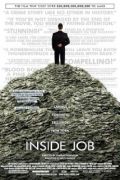
Directed by
Charles Ferguson
120 minutes
Rated G
Reviewed by
Sharon Hurst

Inside Job
Synopsis: Since the Global Financial Crisis in 2008, trillions of dollars have been lost worldwide, millions of people have lost their jobs and the world may never be the same again. Via interviews, visuals, news clips and a narration (by Matt Damon), Inside Job traces how it happened and leaves us in no doubt that we should be mighty fearful that it could easily happen all over again.Sick of the GFC? Not interested in financial matters? Don’t let that put you off seeing this wonderful doco: firstly, because it will explain, even to an econo-klutz, in clearly comprehensible terms, just what the world has been through, but even more so because it will show us what we are up against, in the form of economic sharks and Wall Street opportunists infiltrating government and American educational systems.
Nominated for at least 10 best documentary awards, including this year’s Oscar, Inside Job is a chilling indictment of the highest levels of government, and the management of financial institutions. The film uses terrific visuals from the outset as we pan over bucolic scenes of lovely Iceland and learn, via the narration, what an economically well-run nation it was, with high levels of prosperity. That is until deregulation was brought in allowing multinationals to pillage the country’s resources, encouraging the banks to borrow billions, eventually resulting in bankruptcy for the nation. With this snappy and to-the-point introduction, the film then proceeds to outline in five parts how we got to the GFC, how the bubble of house prices caused world-wide financial catastrophe, the nature of the actual crisis when it hit, just who is accountable for what happened, and finally, where the world stands now.
In easily comprehended segments, we follow the USA in a post depression world, learning about 40 years of unprecedented growth, which all came apart, again due to the deregulation of financial markets. What I liked about the scripting of the narration is the many succinct sentences that insightfully get to the crux of the matter, such as the explanation of how investment banks used to invest with their owners’ money, but when companies went public then they were able to play with the shareholders’ money, giving rise to greed and abrogation of responsibility. We learn about the great sub-prime debacle – the predatory lending of money to folks who had no way of repaying, and we hear of new-fangled financial instruments like derivatives, credit default swaps and collateral debt obligations – all super complex terms but explained in a way that gets the message across so clearly and shockingly. Interviews with people like the finance ministers for France and Singapore add strength to the arguments, while interviews with many of the culprits add an ironic and funny (if it weren’t so grim!) edge to the film-making style.
Sometimes the facts and figures are overwhelming. My head reeled in parts, but what really astonished and sickened me were the amounts the departing CEOs got when their companies, (and shareholders) went down the tubes. Even more shocking was discovering how so many of these unapologetic, unremorseful greaseballs have ended up in high-flying governmental advisory jobs. Talk about conflict of interest!! We also discover how the entire teaching of economics in the USA has been hijacked by these pro-Wall Street people, with many university lecturers also being advisers to government or consultants to large financial institutions.
Inside Job is a powerful film which manages to make a dry, yet vital, subject come alive, and is recommended viewing for all who wish to understand this key historical event.

Want more about this film?


Want something different?




